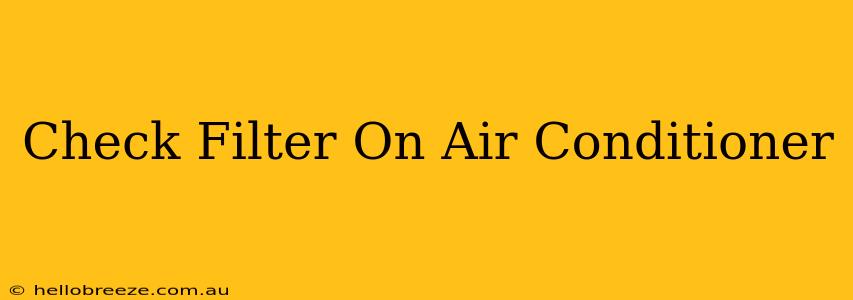Keeping your air conditioner running efficiently and effectively relies heavily on regular maintenance. One of the simplest yet most crucial tasks is checking and cleaning your air conditioner filter. A clogged filter restricts airflow, reduces cooling power, and can even damage your unit. This guide will walk you through how to check your air conditioner filter and what to do if it needs replacing.
Why Checking Your AC Filter is Crucial
Neglecting your AC filter can lead to several problems:
- Reduced Cooling Efficiency: A dirty filter forces your AC unit to work harder to cool your space, leading to higher energy bills and potentially shorter lifespan.
- Increased Energy Consumption: A clogged filter hinders airflow, making the compressor work overtime and consuming more electricity.
- Frozen Evaporator Coils: Restricted airflow can cause the evaporator coils to freeze, a serious problem that requires professional attention.
- Poor Indoor Air Quality: A dirty filter traps dust, allergens, and other pollutants, recirculating them into your home and compromising the air quality.
- Unit Damage: Prolonged use with a clogged filter can strain your AC unit and lead to costly repairs or premature failure.
How Often Should You Check Your AC Filter?
The frequency of filter checks depends on several factors, including:
- Usage: If you use your AC frequently, you'll need to check the filter more often.
- Pet Ownership: Pets shed hair that quickly clogs filters.
- Household Dust: Homes with high dust levels require more frequent checks.
- Filter Type: Some filters are more efficient and last longer than others.
General Recommendation: Aim to check your air conditioner filter at least once a month, or even more frequently during peak usage seasons (summer).
How to Check and Clean Your Air Conditioner Filter
The process of checking and cleaning your AC filter is relatively straightforward:
-
Locate the Filter: The filter's location varies depending on the AC unit's make and model. It's typically found behind a grill or access panel on the unit itself. Consult your owner's manual if you can't find it.
-
Remove the Filter: Carefully remove the filter by gently pulling it out of its slot.
-
Inspect the Filter: Look for signs of dirt, dust, debris, or pet hair. If the filter is visibly dirty or clogged, it's time for cleaning or replacement.
-
Clean the Filter (if reusable): If your filter is washable, follow the manufacturer's instructions for cleaning. This usually involves vacuuming the filter thoroughly, then rinsing it with water. Allow it to dry completely before reinstalling.
-
Replace the Filter (if necessary): If your filter is disposable or too dirty to clean effectively, replace it with a new one of the same size and type. Ensure the new filter is installed correctly.
-
Reinstall the Filter: After cleaning or replacing the filter, carefully put it back into its slot. Ensure a snug fit to prevent air leaks.
Choosing the Right Air Conditioner Filter
Several types of air conditioner filters are available:
- Fiberglass Filters: These are inexpensive but less efficient at trapping smaller particles.
- Pleated Filters: Offer better filtration than fiberglass filters.
- HEPA Filters: High-efficiency particulate air filters trap a higher percentage of airborne particles, including allergens and pollutants.
- Electrostatic Filters: These filters use static electricity to attract and trap dust and other particles.
Choose a filter that best suits your needs and budget.
When to Call a Professional
While checking and cleaning your AC filter is a simple DIY task, some situations require professional help:
- Severe Clogging: If the filter is extremely clogged and difficult to clean, it may indicate a larger problem with your AC unit.
- Persistent Freezing: If your evaporator coil continues to freeze despite filter cleaning, it may be a sign of a refrigerant leak or other issue.
- Lack of Cooling: If your AC unit still isn't cooling properly after cleaning the filter, professional service is necessary.
By regularly checking and cleaning your air conditioner filter, you ensure efficient operation, optimal cooling, and a longer lifespan for your unit. Remember, prevention is always better than cure when it comes to air conditioner maintenance.

